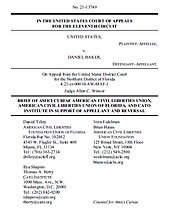While potentially shocking, Baker’s posts were in line with much of the rhetoric of the day. Throughout 2021, many public statements about the 2020 election and the events of January 6 were sharp, inflamed, and discussed violence. Baker’s posts were not unusual in this regard. What is unusual is that Baker was charged with the federal crime of making a “threat to injure the person of another.” Baker was convicted and sentenced to 44 months in prison. Now Baker is appealing his conviction to the Eleventh Circuit, arguing that his conviction violated the First Amendment. The ACLU, joined by Cato, has filed a brief supporting Baker.
In the brief, we explain that Baker’s statements did not meet the high bar for “true threats,” which can be punished consistent with the First Amendment. First, no reasonable person reading Baker’s statements would have understood them as expressing a serious intent to lay siege to the Florida Capitol. Baker’s statements were expressly conditioned on outlandish events: a group of individuals attacking the Florida Capitol, overpowering police, and occupying the building. Publicly reported law enforcement intelligence at that time showed that there was no threat of a coup at the Florida Capitol.
In addition, because no one planned to attack the Florida Capitol, Baker’s statements encouraged taking action against people who did not exist. His statements contemplated armed resistance against a non-existent treasonous militia, and thus no actual person could have felt personally threatened by the statements. Finally, the statements were communicated to a general audience on a matter of public concern. He published the posts on Facebook in the midst of political discussions about whether the 2020 election was stolen and what exactly occurred during the January 6 riot. Baker’s statements may have been intemperate, but the First Amendment protects a great deal of political advocacy that many people would find offensive or alarming.
Together, these three factors make clear that Baker’s speech was protected by the First Amendment and could not be criminally punished. The Eleventh Circuit should vacate Baker’s conviction.




